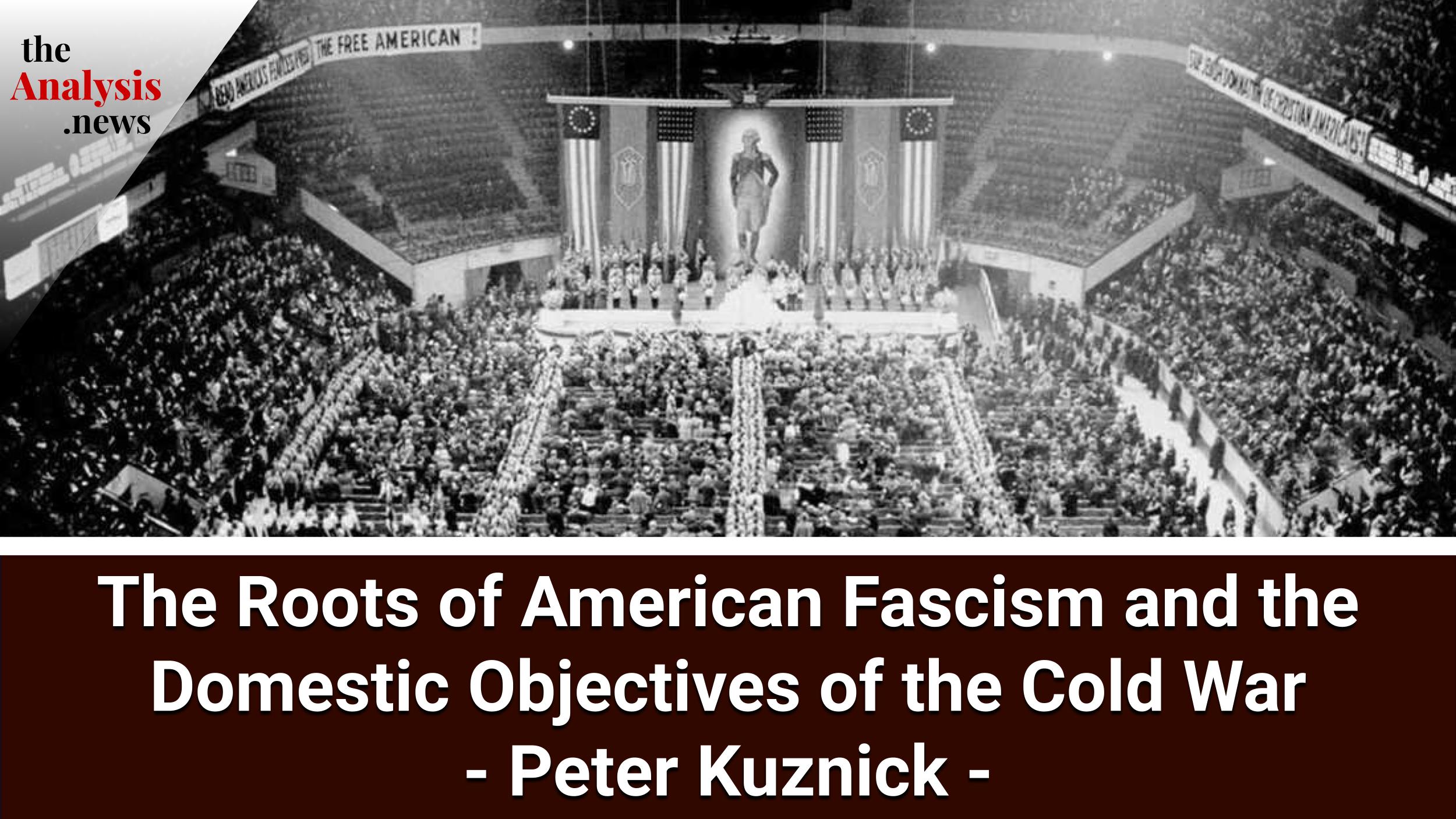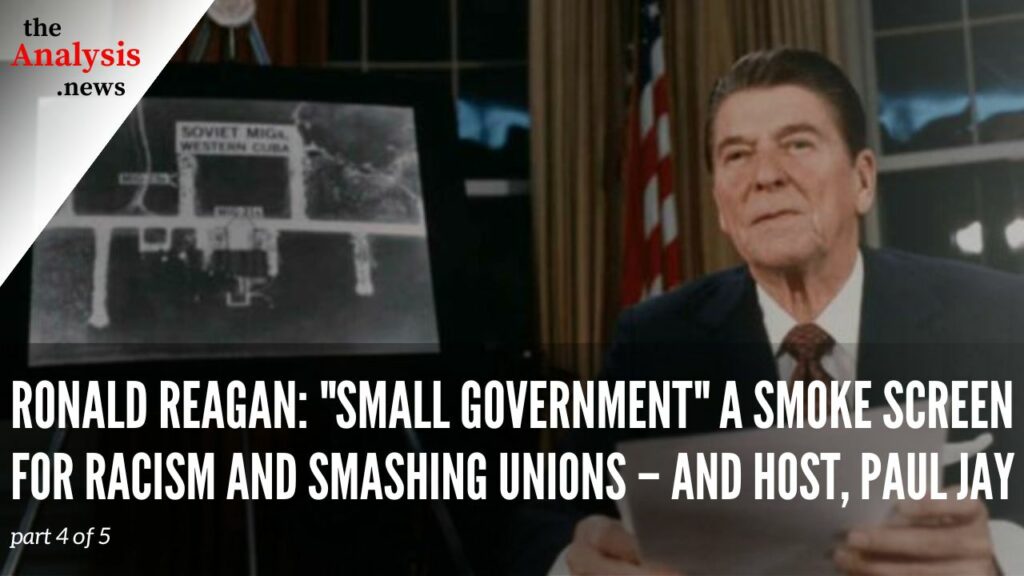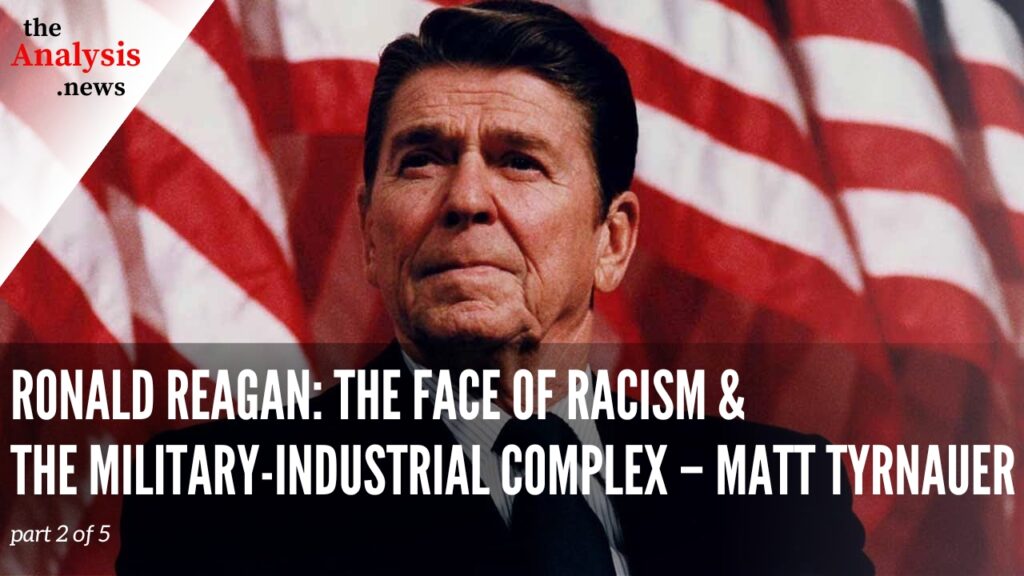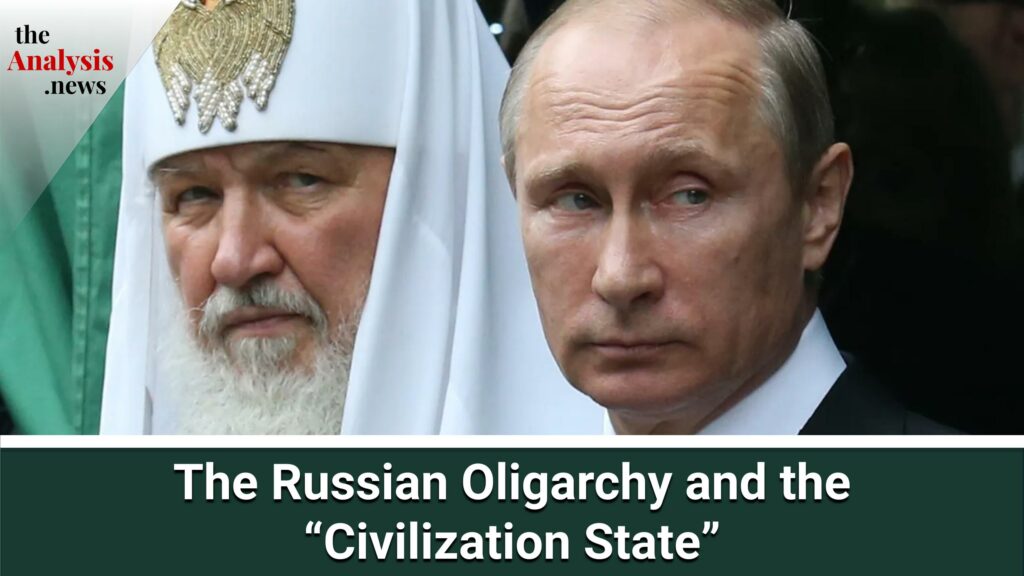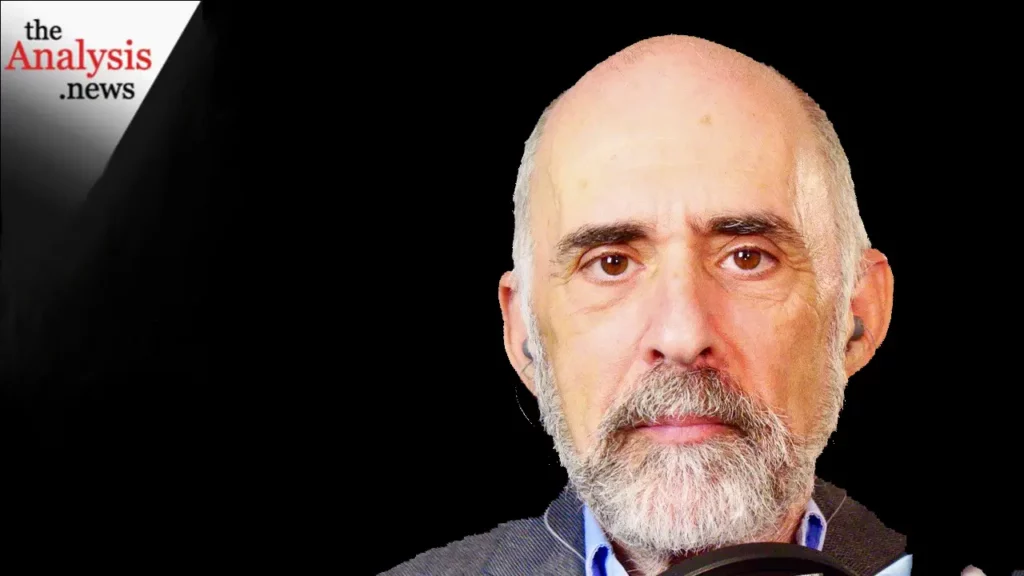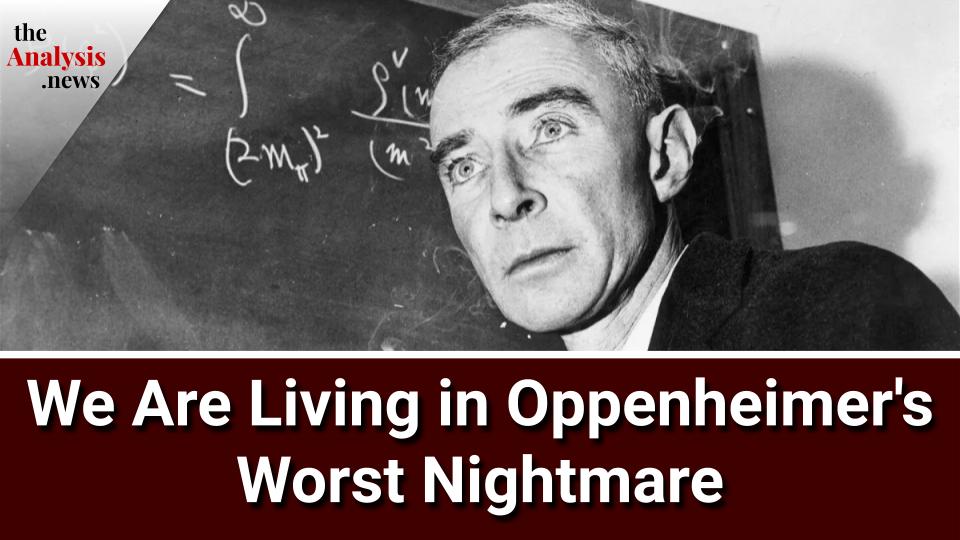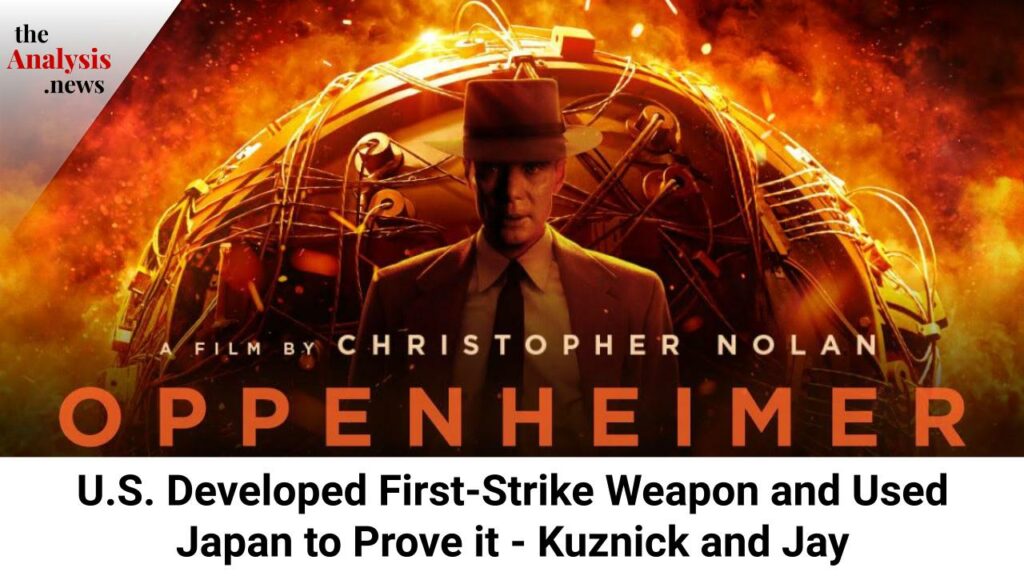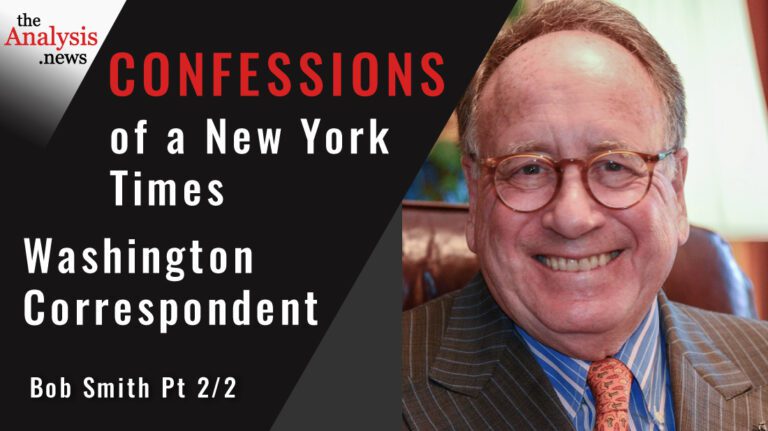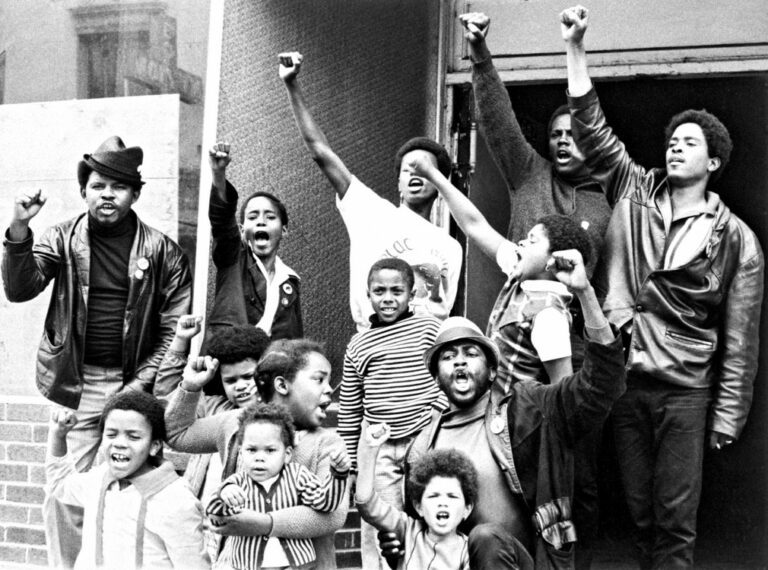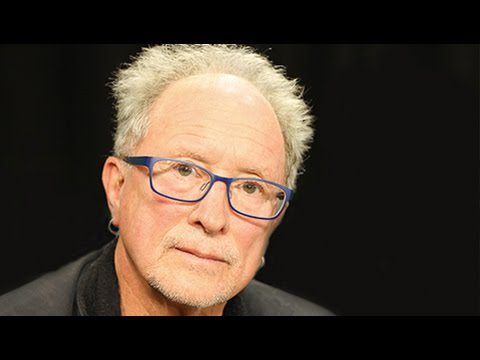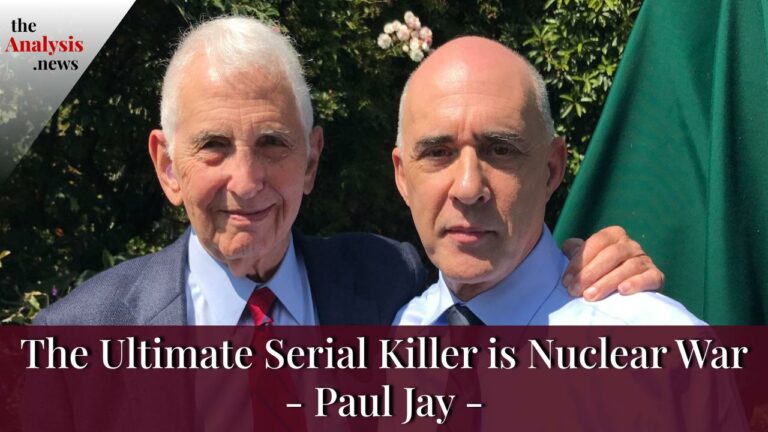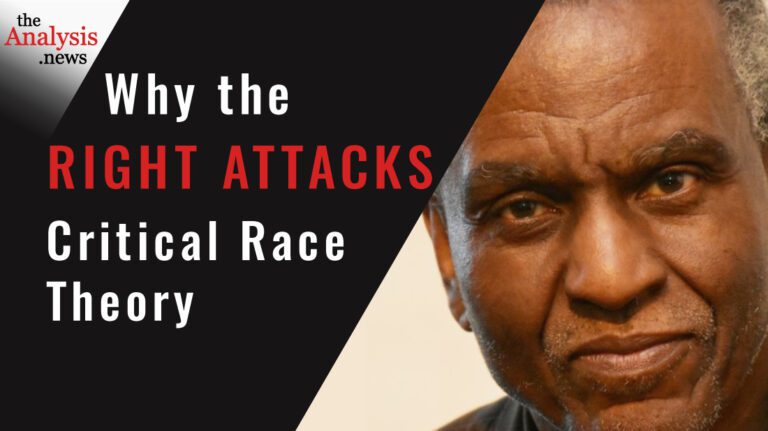Historian Peter Kuznick and host Paul Jay discuss Smedley Butler and the 1934 attempted coup against FDR, the real objectives of McCarthyism, and the purge of the trade unions.
Oppenheimer: U.S. Developed First-Strike Weapon and Used Japan to Prove It – Peter Kuznuck pt 1
Paul Jay
Hi, I’m Paul Jay. Welcome to theAnalysis.news. In a few seconds, I’ll be back with historian Peter Kuznick. It’s the second part of our interview about the film Oppenheimer, where we’re going to dig into the Cold War, but more so the domestic objectives of the Cold War. In other words, smashing unions, smashing labor, and attempting to smash progressive politics. That gets touched on a bit in the movie, but we’re going to dig a lot deeper. I’ll be back in just a few seconds.
In my last interview with Peter Kuznick, we discussed the Oppenheimer film, as I said, and we talked about what the film got right and what the film got wrong about the history of the bomb. Today, we’re going to look at the domestic objectives of the Cold War and why the Cold War as such usually refers to the post-World War II world and is usually described as a geopolitical struggle.
There were clear domestic objectives in McCarthyism in the House of Un-American Activities Committee. People were accused of being agents of the Soviet Union, but there really wasn’t much about that. You’ll find out what it was more about. In fact, the forces behind McCarthyism had been at work long before the war.
On April 29, 1938, President [Franklin D.] Roosevelt gave a speech titled A Message to Congress on Curbing Monopolies. Here’s a quote from the opening of that address.
The first truth is that the liberty of a democracy is not safe if the people tolerate the growth of private power to a point where it becomes stronger than their democratic state itself. That, in its essence, is Fascism—ownership of Government by an individual, by a group, or by any other controlling private power.
The second truth is that the liberty of a democracy is not safe if its business system does not provide employment and produce and distribute goods in such a way as to sustain an acceptable standard of living.
Both lessons hit home.
Among us today, a concentration of private power without equal in history is growing.
Now, again, that was 1938. It could have been written yesterday, I suppose. The forces that FDR was talking about apparently tried to organize a coup against him in 1933. We’re going to talk about the roots of American fascism in the far-right.
Now, joining me is Peter Kuznick. He’s a professor of history and director of the Nuclear Studies Institute at American University. He and Oliver Stone co-authored a 10-part Showtime documentary film series and the book—and I’d really urge you to go get the book because there are lots in the book that isn’t in the series—both titled The Untold History of the United States. He’s begun his fourth three-year term as Organization of American Historians Distinguished Lecturer. Thanks very much for joining us, Peter.
Peter Kuznick
Good to be with you, Paul.
Paul Jay
Why don’t we start with what we know about this coup, which, as far as I can make out on the coup itself, the conspiracy was in 1933, but it started to go public in ’34. What happened?
Peter Kuznick
Well, the American Liberty League, an organization of right-wing businessmen, formed in 1934, and they were committed to defeating the New Deal in any way they could. Remember that Roosevelt came to office without a clear philosophy and without a clear program. During the campaign, he was criticizing [Herbert] Hoover from the right on occasion, saying that Hoover was running too big a deficit. They unbalanced the budget. The government was spending too much. But when Roosevelt took office and saw how serious the problems were, beginning with the collapse of the banking system, he moved much more boldly.
He didn’t have a clear philosophy but was willing to try. It was experimentation. It was pragmatism much more, although some of the people he put into office had a much better vision about how to reform the country and reform the economy. Roosevelt’s policies became much more progressive. They were somewhat timid and tentative in the first few years. But by 1934, ’35, and ’36, what we saw was an upsurge of labor and an upsurge of the left.
Beginning in the ’34 midterm elections and even more in ’36, the left had taken over the country. After ’34, the New York Times said the Republican right wing had been wiped out in the United States. They did even better in 1936. That was on the shoulders of the labor movement.
In 1934, we had the general strikes. We had the Toledo auto workers in Ohio led by the Musteites [A.J. Muste, Clergyman and Political Activist]. We had the Minneapolis Teamster strike, led by the Trotskyists [Leon Trotsky, Soviet Politician, Journalist, and Political Theorist]. Then we had the San Francisco Longshoremen strike, led by Harry Bridges [American Labor Leader] and the communists. These were all organizing the unemployed to support the workers rather than have them fighting against each other. In those cities, not only did the workers on strike rally, but the rest of the population rallied in support of the unions and the strikers. These would go on for days. Some of them were violent as the police tried to crack down on them.
I think it was Eric Sevareid, the later famous journalist, who said that when he saw the attack on the strikers in Minneapolis, he could sense what fascism meant in his bones.
In 1934, what we saw in ’33-’34 was a coup attempt in which several people approached Smedley Butler. Smedley Butler was a very important figure who has been largely lost to history. Butler was the most decorated Marine in the country. Butler should have been the head of the Marines, but he was a little too outspoken for some people. He’d been involved. He wrote a very important book called War is a Racket, where he said, “I didn’t understand it at the time, but we put it all together. When I look at the places we intervened, we were going in to country after country to overthrow governments and overthrow revolutionary forces in the interests of American big business and American bankers.” It’s a great statement that should be widely remembered.
Butler was extremely popular. He’d been involved in the Bonus March in ’32. They approached him and wanted him to organize a fascist coup to overthrow the Roosevelt government.
Paul Jay
Now, to explain that march he got involved with, if I’m correct, is that the one with the vets? There were thousands of vets, and [Dwight D.] Eisenhower and some other generals wanted to take out the machine guns and, in some instances, did.
Peter Kuznick
Well, Eisenhower and [George S.] Patton were on [Douglas] MacArthur’s staff. MacArthur was really the head of the U.S. Forces. MacArthur, interestingly, is going to be one of the people who was behind, or allegedly behind, this coup that occurred in the 1930s. MacArthur was very right-wing in his views. Eisenhower was not. Eisenhower and MacArthur had a long-standing feud that began, at least at this point, in 1932. Eisenhower was ordered by MacArthur to support the troops as they went after the bonus marchers.
The bonus marchers were World War I veterans who had been promised a bonus but off in the future. They came to Washington to organize to speed up the bonus because they were desperate during the Depression in 1932. That was really the nadir or the low point in the collapse of the economy, late ’32, early ’33. MacArthur and the troops moved in. They attacked the protesters, as well as veterans. They burned down their village. They chased them through the streets. When Roosevelt saw this, he turned to an associate whom he was with and said, “This will get me elected,” because Hoover was blamed for this.
Paul Jay
Butler went out and defended the vets and became their hero.
Peter Kuznick
Smedley Butler, yes. Smedley Butler did. He was already a hero and a heroic figure. He’d been in the Marine Corps for decades and was very highly decorated. They approached him in ’34, knowing that he was the most popular figure among the military and the veterans and he could organize a coup if he was so inclined, but he was not. He told them that he would organize a half million men to defeat them if they tried any of these kinds of shenanigans.
In 1934, late ’34, November, the Congress had hearings. The person who chaired the hearings was Congressman [John W.] McCormack. McCormack’s comments are quite important. Let me see if I can find them.
After the hearings and hearing the testimony, he said, “They had been able to verify…” this is John McCormack of Massachusetts, who’s the Chair of the House Committee. He said, “We’ve been able to verify all the pertinent statements made by General Butler, except for [Gerald C.] MacGuire’s direct solicitation of his services,” which the committee accepted as fact. They concluded that “Attempts to establish a fascist organization in the United States were discussed, were planned, and might have been placed in execution when and if the financial backers deemed it expedient.” The evidence is overwhelming.
Paul Jay
Even though, at the time, the New York Times trashed Butler and said this was all made up and make-believe.
Peter Kuznick
Well, they weren’t the only ones. But the New York Times was a very conservative newspaper then. We could say the same thing now, but it’s a different form of conservatism. The Times was clearly against Butler, the New Deal, and the reforms that were taking place.
The ’30s were a very interesting period, which is why I like to teach courses on the ’30s because we had so much radicalism. A big debate is, was the ’30s the Red Decade? You and I have talked about that in the past. But if it wasn’t the Red Decade, there was certainly a decade in which the communists, socialists, reformers, and radicals were reaching a large proportion of the American people. The overwhelming view was that capitalism had failed. The evidence of that, just like the evidence of climate change for people who are not believers, is all the floods and the fires, the extreme weather they see around them. Well, the evidence in the ’30s of the collapse of capitalism was all the unemployment, suffering, and misery.
Roosevelt moved in with New Deal programs in many ways to ameliorate and dissuade some of that suffering. The New Deal succeeded in that regard. The New Deal put people back to work. The New Deal built roads, it built parks, it built airports, it clothed people, it supported writers and supported all kinds of what would be considered far to the left of the progressive wing of the Democratic Party today, or at least some of them.
I was just saying that Roosevelt, without being a socialist by any means and saying he believed in the Democratic Party and in capitalism effectively, was willing to experiment with ideas that would be considered radical because the economy was in such dire straits. Many people, like Joseph Kennedy Sr., said they supported Roosevelt because he saved capitalism from the capitalists. In many ways, he did do that with his reform programs.
Paul Jay
In ’38, when FDR gave that warning and that speech I quoted off the top of curbing monopolies, he says—and he’s mostly, I think, referring to the banking sector, that if the banking sector gets control of the state, that’s a form of fascism. That’s what the country seemed to be on the road to until the war broke out. Sorry, go ahead.
Peter Kuznick
Roosevelt’s attitude during the Second New Deal, the second hundred days, 1935 on, is he’s had it with the business community. He tried to placate them, tried to be an Obama and bent over backwards to placate the bankers in some ways. Even with his banking reform, he was in a position in ’33 to nationalize the banking system. Many experts at the time said he could have done it without a word of protest, but he chose not to do that. By ’35, he had had it. He said that these critics in the business community are like people who, if you dive in and rescue somebody from drowning, then they later berate you for not having saved their hat.
Roosevelt said by ’35, “I welcome their hatred. I welcome their hatred. Let them say whatever they want about me, but they represent the past, and they represent the obstacle to progress and to humane solutions, and we’re going to do this without them.” He had the backing of the labor movement, and he had that upsurge. They had people voting and voting in favor of left-wing politicians and programs. He was in a position to do that.
Paul Jay
But he didn’t do something, and maybe because he’s heading into a war and he knows it, but he talks about the concentration of wealth and ownership and the banking sector. When he made that speech about curbing monopolies, he didn’t actually curb the banking monopoly in the sense that there were some regulations, but there wasn’t any nationalization.
Peter Kuznick
By ’38, he had lost his fervor for reform. He got a huge victory in ’36. But in ’37, he tried to do the Supreme Court reform, adding justices for everybody over a certain age who didn’t retire. You remember the Supreme Court had been voting against New Deal policies until ’35. Then, finally, somebody switched sides, and they started to support that. They voted against the National Industrial Recovery Act. They said that was unconstitutional. The Agricultural Adjustment Act, and said that was unconstitutional. So, Roosevelt decided he’s got to reform the Supreme Court. You know, in some ways, a similar situation to what we face now with this extreme right-wing Supreme Court that goes against the will of the American people, much like the Supreme Court did then. Then, at least, the Supreme Court switched and started to support New Deal programs. But Roosevelt decided to try to pack the court anyway in ’37 and overreached.
But it’s also shortly thereafter what happens in ’37. He decides that he’s going to rebalance the budget, and he cuts a lot of the New Deal spending, and the economy plummets into another recession in 1937. By ’38, he was announcing that the reform phase of the New Deal was over, which was tragic because we had, at that point, this big upsurge among physicians. They were calling for creating a national healthcare system, one that was far more inclusive and far more radical than anything we’ve seen since.
[Robert F.] Wagner, Senator Wagner from New York, introduced legislation in early ’39 to achieve that, and many thought that that would be the high point of the New Deal. But Roosevelt basically undercut the support for that. It was partly because he was going into the 1940 re-election and partly because he didn’t want to alienate and antagonize the very reactionary American Medical Association.
In some ways, he was going in the right direction by ’40, and in some ways, in the wrong direction. The best thing he did in ’40 was to choose Henry Wallace as his Vice President because he knew that Wallace was a leading anti-fascist in the cabinet. He knew that Wallace was extremely popular. He knew that Wallace was far to the left of Roosevelt himself as a real progressive, and he wanted to shore up that wing also. That was among the most visionary things that Roosevelt did.
Paul Jay
I’m going to jump now to the end of World War II. In the last interview, we talked about how the real objective of the Cold War was less about real concern about military expansionism of the Soviet Union, which I think is now clear there wasn’t, not in a military way, but what they were really concerned about was the spread of national liberation movements, who were going to gravitate towards an alliance with socialism and the Soviet Union.
In terms of the domestic situation with McCarthyism and the House of Un-American Activities Committee, while the targets are all accused of being essentially agents of the Soviet Union, that isn’t really what it was about— 99.9 % of the people they went after, their objectives were not to be agents of the Soviet Union. What were the domestic objectives of the far-right in terms of what was going on? Why did, at least for some time, [Harry S.] Truman and the Democrats go along with it, if not quite participate?
Peter Kuznick
No, they participate. Beginning in 1946, the chair of the Republican Party said that the upcoming elections were going to be a choice between republicanism and communism. It was as early as ’46 that they began accusing the Democrats of being overrun by members of the Communist Party. The implications are, and the goal was to undermine the New Deal, to argue that the New Deal was really a communist-influenced program. The business communities still hated the New Deal. They still resisted progressive reform in 1946, but they were in a weakened position at the time. They keep up this drumbeat of attacks on the New Deal and the Democrats as being communist-infiltrated.
We had up in Canada, as you might know, an instance of someone in the Soviet Embassy in Ottawa getting involved in espionage, and I think that was in ’46 also. In ’47, the Republicans were feeling much more aggressive, and they began some of the Red-baiting. They escalated the Red-baiting in 1947. The first group they go after, they target, as the weakest link in American national security, is the Atomic Scientists. They accused Edward Condon and others of threatening U.S. national security in ’47.
The first group they really investigated was Hollywood. Now, did Hollywood pose a serious threat in terms of supporting the Soviet Union? No. But Hollywood was a hotbed of leftists and radicals, and they had formed anti-fascist organizations in the 1930s and early ’40s, and they were outspoken in their pro-union, anti-fascist views. They went after the Hollywood 10, starting in 1947. There’s this crackdown that takes place.
The other part that you mentioned is very important, in that Truman decides he’s going to get out ahead of this. He does so by calling for his own loyalty security hearings and saying he’s going to have his own loyalty purge of people in the government, of government employees. They began having rallies at which they would pledge allegiance to the United States. They would sing “God Bless America,” and they would sign these loyalty oaths.
An interesting comment was by Clark Clifford, who was one of Truman’s closest aides on domestic policy. He later said, “The President didn’t attach fundamental importance to the so-called communist scare. He thought it was a lot of baloney. But political pressure was such that he had to recognize it. We didn’t believe there was a real problem. A problem was being manufactured. There was a certain element of hysteria.” They began to purge communists, people who wouldn’t sign loyalty oaths, or people who had been communists at some point.
An Interior of the Department Loyalty Board Chairman said, “Of course, the fact that a person believes in racial equality doesn’t prove that he’s a communist, but it certainly makes you look twice, doesn’t it?” This is the thing. This gets picked up everywhere, especially California, but New York also. Very soon, we’ve got 22 states that are imposing loyalty oaths. One of the groups they go after is the teachers. In California, they went after the universities. At Berkeley, at Stanford, they purged the left-wing professors. But this takes place all over the country.
We mentioned the tie-in to Oppenheimer. Well, Oppenheimer himself was looking for cover by ingratiating himself to the power to show that he was really loyal to them. However, his brother, Frank, who was a member of the Communist Party, does get fired. I think it was from the University of Minnesota at the time. So, that was happening.
Paul Jay
There’s an important moment in the film when they’re having this review of Oppenheimer’s security clearance, and his wife comes and testifies and gives this big speech about how we’re not communists; maybe we were fooled before, but we’re not anymore. It plays into this whole hysteria because the vast majority of people who are involved in the Communist Party or all the various socialist organizations are active in unions. They were fighting for reform and progressive ideals within the United States. Many of them, in fact, didn’t even support the Soviet Union. It wasn’t like a monolithic pro-Soviet left either. The objective was to crush, I think, to a large extent, the trade union movement. If I’m right, it was in 1945-46, there were more strikes than there had been in any year previous to the war. The domestic agenda of the Republicans was this has to be crushed.
Peter Kuznick
Yes. The communists played a crucial role in building the labor movement in the 1930s. Communist organizers were the backbone of the organizing effort in auto, steel, rubber, and other key sectors. When the CIO [Congress of Industrial Organizations] was organizing among unskilled and skilled workers in the mass industrial sector, the AFL [American Federation of Labor] had been very narrow, parochial, and conservative.
Now, the CIO comes on the scene in ’35, and the communists are the principal organizers. The communists were also the leading organization speaking out for Black civil rights in the United States for integrating baseball. Jackie Robinson, despite his later testimony against Paul Robeson, was at the forefront of the anti-fascist movement, which is why the ’39 reversal during the Nazi-Soviet Pact is so appalling to many people because the communists had been the leaders of the anti-fascist movement until [Adolf] Hitler and [Jospeh] Stalin signed that Pact in ’39, and then the communists quieted down on their anti-fascism. Many people hated the opportunism. The communists and the Soviet Union were seen, in many ways, very positively in the 1930s, partly out of ignorance. People didn’t know the atrocities of Stalinism yet.
In the early ’30s, and I’ve written about this, the Soviet Union was being portrayed not only in the Nation and the Republic but also in Business Week, Christian Science Monitor, Wall Street Journal, and all these conservative publications as the only country in the world that had not been touched by the Depression.
There was a rumor in the early ’30s that Amtorg was going to be hiring American workers to go to work in the Soviet Union. Thousands stormed the Amtorg offices the next day. American workers wanted to go to the Soviet Union to find work. They had this vision that the Soviets were providing whole education, housing, healthcare, the safety net that the capitalist countries were not providing. A lot of that was overblown. There were terrible things happening in the Soviet Union, as we later learned. The Soviets were seen as the country that was organizing their five-year plans around science and technology. American scientists were greatly influenced, as they became increasingly left-wing in the 1930s, greatly influenced by the Soviet model. The physiologist conference in Russia and the Soviet Union in 1935 was the high point. There were a lot of exchanges between the American and Soviet scientists in the ’30s. The Americans were envious of the Soviets until later in the decade, when some of their allies were getting purged and disappearing. They start to wake up a little bit to the ugly side of Stalinism.
Paul Jay
There’s so much of this history we can talk about, but I’ll jump to a point. People who watch theAnalysis know I’m working on this film based on Daniel Ellsberg’s work. He writes about how whatever was going on domestically in the Soviet Union, and as you say, atrocities and the development of the police state. Ellsberg came to realize that, in fact, he had thought that Stalin was another Hitler seeking world domination. He says that it turned out to be a fantasy, that the Soviet Union did not have these kinds of global military objectives and that the American elites knew it. It was very convenient to keep portraying that as the Russians are coming, the Russians are coming, and to a large extent, it helped intimidate and crush the left at home.
Peter Kuznick
We see a lot of that going on today, very, very similar. People who attribute to Putin this vast plan to take over the world, I think, are wrong. I don’t think Putin has that vision, but I know a lot of people, very intelligent people, who disagree with me firmly on this question about Putin’s motivation.
Paul Jay
Yeah, I disagree with you a little bit on this. When I look at some of the ideological, philosophical appeal of Putin to some of the really even pro-fascist, pro-Nazi Russians, it’s as bad as the Ukrainians’ revival, the Ukrainian fascists. I would say if Canada could, Justin Trudeau, I should say, he would love to rule the world. I think it’s inherent in all these bloody governments and systems. But let’s not argue about Putin right now. Certainly, the overblown accusations are similar.
Peter Kuznick
Let me just say that I’m also a harsh critic of Putin. I’m not a fan of Putin by any means, and I don’t support the invasion of Ukraine.
Paul Jay
Yeah, I know. Anyway, certainly, it’s overblown. The worst thing that’s overblown about Putin, I think, is the total hypocrisy of the people who are overblowing it. If anyone’s tried to rule the world, it’s the U.S. It’s very hard for them to have any credibility accusing someone else of that. Let’s park that for another day. I know you agree with what I just said.
Peter Kuznick
Yes.
Paul Jay
Sorry, go ahead.
Peter Kuznick
Dan starts off as a real cold warrior. I remember some of the first discussions that he and I had were comparing where I was coming from. I was smart and learned enough about the ’50s. Later, my views on the early Cold War and Dan’s were a little bit different still. Dan starts off as a real hardline anti-communist and a cold warrior. It’s his gradual awakening that allows him to do what he did with the Pentagon Papers and to be the critic he became of Vietnam. Even before he gets that realization, as you know, he’s already becoming a very strong critic of U.S. nuclear policy, even before his worldview broadens.
The point you’re making before, about ’45 and them wanting to go after labor, is absolutely correct. It’s going to take a little bit of time before they can. They do put into the 1947 Taft–Hartley Act, which Truman vetoed, Section 9(H). Section 9(H) effectively calls for affidavits to be signed by the leaders of the unions. The communists had not only organized the CIO and the mass industrial unions in the United States, but about 20% of the CIO unions were communist dominated after World War II. What we see in ’47, ’48, and even a little bit later, is the purging of the left wing of the labor movement. They got to start with the mine, mill, and smelter workers.
Paul Jay
Well, I need to get a little moment of transparency here for me because my father was a business agent for Mine Mill. He was Canadian, had been in the U.S., and had to come back to Canada because he was assuming he was going to be targeted.
Peter Kuznick
Yeah, they were a very progressive union, communist-dominated, but so was the U.E., United Electrical Workers, which was a huge union, the West Coast, Longshoremen, the ILWU, led by Harry Bridges, who had run the strike in 1934 in San Francisco. The communists were very influential in the ports.
Even later, when I showed my students some of the anti-communist films that were made in the early ’50s, when Hollywood turned out about 50 anti-communist films that were all terrible in order to show their loyalty. Two of them that I show them some clips from: The Woman on Pier 13, it was also called I Married a Communist, and Big Jim McLain, a John Wayne film, it’s about the communists taking over the ports in order to block the shipment of goods during the Korean War. This was an important theme, and the communists were enormously influential among the dock workers, the longshoremen, and the Stevedores. They purge them from all these different unions, especially the ones the communists dominated. The CIO helps them. The CIO also runs unions against them in the areas in which they still have influence.
Paul Jay
For people who don’t know, the CIO was one of the main union central, national centrals.
Peter Kuznick
The Congress of Industrial Organizations, founded in 1935, and initially started by John Lewis, the mine workers head, but the organizers they brought in were the communists. They organized the vast majority of American workers, the huge unions. When the labor movement was powerful, labour movement was never going to be powerful again in the United States after they purged the communists and then the communists were also purged from the steelworkers, and they were purged from the auto workers. This goes on.
What happens is, just like with the civil rights movement, what does it mean to purge W. E. B. Du Bois From the NAACP [National Association for the Advancement of Colored People] because he supported Henry Wallace in 1948. What does it mean to effectively cancel Paul Robeson even before the State Department takes away his passport? We see this with the left wing of the civil rights movement. Tragically, we see with the left wing of the labor movement, we see with leftists in academia. We see it with leftists in Hollywood. What do we get as a result? We get a brain-dead generation in the 1950s. Some of the scientists were still organizing on an anti-nuclear basis, and the civil rights movement was not quite dead in the 1950s, as we see with Martin Luther King, some of whose close advisors were communists.
The real heart of the reform movement from the 1930s and early 1940s was stifled. It was killed. It was silenced. It was undermined. The organizations were destroyed. We get one of the worst decades in American history, and it’s mind-dead. Then, people talk about the horror stories on every campus. The theme behind the [Joseph] McCarthy purges was to turn Americans into a nation of stool pigeons. Mary McCarthy comments on this. I have Stone’s comments on this, where the test of being a good American is whether or not you’re willing to name names to turn your comrade in. That’s what they did. They didn’t find communist infiltrators. They didn’t find subversives. They didn’t find spies. What they did was if you were called before the committee in order to redeem yourself, you had to name names. If you didn’t know the names of anybody, they’d give you the names of people, and that happened frequently.
The people tried to restore their reputation by going before these committees and naming names. Every studio had its clearers, their smear and clear committees.
If you look at who the people they went after were, the ones who formed the Committee on the First Amendment in 1947 to support the people who were being victimized in Hollywood, some of the names I’ll just throw out there, these were the ones who defended against the Red-baiters in Hollywood: Gregory Peck, Lucille Ball, Burt Lancaster, Robert Ryan, Frank Sinatra, Edward G. Robinson, Robert Young, Paulette Goddard, Henry Fonda, Katharine Hepburn, Pete Seeger, Leonard Bernstein, Ethel Barrymore, Eddie Cantor, Kirk Douglas, Deanna Durbin, Ava Gardner, Benny Goodman, Walter Huston, Fritz Lang, Peter Lorre, Groucho Marx, Orson Welles, Lauren Bacall, and it goes on and on.
Paul Jay
All of these people were risking their own careers. For those younger people who have never heard of most of these people, these were amongst the biggest stars in Hollywood, which is why they could do this.
Peter Kuznick
Then, on the other side, you have the John Waynes.
Paul Jay
Ronald Reagans.
Peter Kuznick
Ronald Reagan, especially as the head of the President of the Screen Actors Guild. Reagan was working with the FBI to purge members, and for being disloyal. There was a fight going on about the majority of the creative people in America, the writers, the Hollywood filmmakers, the artists, the scientists, and the academics were all on the left. If they weren’t members of the Communist Party, they were supporters that went through the Communist Party front groups, and the reform movement of the United States was killed. We don’t see it reemerge until the mid to late 1960s.
Paul Jay
In the Vietnam War.
Peter Kuznick
Seventeen years, yeah. The left is going to be driven underground, largely silenced, and discredited. What they managed to do is equate dissent with disloyalty. That’s the dangerous thing. We see that happening again. When those of us who are critics of U.S. policy on Ukraine are accused of being Putin’s dupes and Putin apologists. Most of the people who want to see peace in Ukraine hate what Putin’s doing and don’t support that. But that doesn’t mean we want to see nuclear war or that we want to see unending war in Ukraine with another half a million dead and wounded a year from now and no progress being made. But that same neo-MccArthyism that we see playing out now is the same as what was happening then. The media has always been dominated by those people. We know from the documents that came out how many of the people in the media, which is why you need to be doing these kinds of shows, were on the CIA payroll. They have always been. Now they’re not necessarily on the CIA payroll, but they’re on the CNN, MSNBC, and Fox News payrolls. Well, the admirals and generals that come out every day when people who are critics in any way are not allowed to breathe a word on mainstream American television or really radio.
I saw what happened with Oliver Stone and me when it came to even NPR. If you’re a critic of the American Empire and you call it out for what it is, you can even get cancelled on NPR. We did an initial round of shows on MSNBC, CNN, and elsewhere, but then they silenced us after that.
Paul Jay
Yeah, and only that because Stone’s a celebrity. If it hadn’t been for that, you wouldn’t have got a minute on those networks.
Peter Kuznick
I don’t get a minute now on mainstream television. I do 230 TV interviews around the world on mainstream television in every other country except in the United States my own country.
Paul Jay
I got to know Gore Vidal pretty well before he died. In the late ’60s, Gore Vidal was one of the most prominent political pundits on television. There’s the famous debate between him and [William Frank] Buckley Jr. during the Democratic Party convention. He was a massive celebrity in the media. As his critique became more sharp on U.S. foreign policy, U.S. imperialism, he would use those words, “empire,” he disappeared from mainstream media.
Peter Kuznick
Yeah, he talked about the American Empire a little too openly. But not just me and Oliver, Howard Zinn never would get on mainstream media. Noam Chomky, and Dan Ellsberg. In the end, Dan had all this applause. They finally recognized Dan’s great contribution to humanity, and he was getting lionized. Between the Pentagon Papers and the end of his life, he was very rarely getting that kind of public attention.
Paul Jay
When they did interview him over and over again in the few months before he died, it was all about whistleblowing and the Pentagon Papers. They didn’t want to talk about his critique of American nuclear policy, American war policy in general. He barely got asked about those things.
Peter Kuznick
But that’s what he wanted to talk about.
Paul Jay
Well, they’re going to have to watch our film. By the way, it’s going to be called How to Stop a Nuclear War. It’s too early. There’s nothing to see yet. We’re at least a year away.
Listen, there’s a lot more we can talk about. I think we’re going to have to do another segment because this attempt by the far-right, if they can’t win an election, to use extra-parliamentary means to get power, January 6 wasn’t the first time. There’s a whole history of this, including what happened around Kennedy. Let’s not get into it now. I’ll just tease it. Go ahead.
Peter Kuznick
There was a recent statement by Paul Landis, this Secret Service agent who was in the car behind the Kennedys when he got shot, about the magic bullet that totally discredits the magic bullet theory, the idea of the lone assassin. This is really devastating to the people who made that case on the Warren Commission. It’s really exposed the hollowness of that claim, which most Americans didn’t believe from the get-go. Even before Oliver’s movie, JFK, came out, Americans were not buying the Warren Commission report.
Paul Jay
Well, I would recommend everybody go back, especially younger people who probably haven’t seen this, but go watch Seven Days in May, which is about an attempted right-wing military coup against a centrist, progressive-y president who just wants to have an arms limitation treaty with the Soviet Union and they try to overthrow him. I just found out recently that, apparently, Kennedy actually asked [John] Frankenheimer to make that movie because he thought such a thing might happen to him. I’m not going to see anymore now. We’ll do more later. We’re going to do another one in a few weeks. Thanks very much, Peter.
Peter Kuznick
Thank you, Paul.
Paul Jay
Thank you for joining us on theAnalysis.news. Please don’t forget that we can only do this if you donate. You could go to the website, theAnalysis.news, click the donate button, get on the email list, and we’ll be back with more. Thanks again.
Podcast: Play in new window | Download | Embed
Subscribe Apple Podcasts | Spotify | Android | iHeartRadio | Blubrry | TuneIn | Deezer | RSS
Never miss another story
Subscribe to theAnalysis.news – Newsletter
Peter Kuznick is an associate professor of history at American University and director of the Nuclear Studies Institute. Kuznick founded the Committee for a National Discussion of Nuclear History and Current Policy and co-founded the Nuclear Education Project. He is the author of Beyond the Laboratory: Scientists as Political Activists in 1930s America, co-editor of Rethinking Cold War Culture, and co-author of Rethinking the Atomic Bombings of Hiroshima and Nagasaki: Japanese and American Perspectives (in Japanese, 2010).
